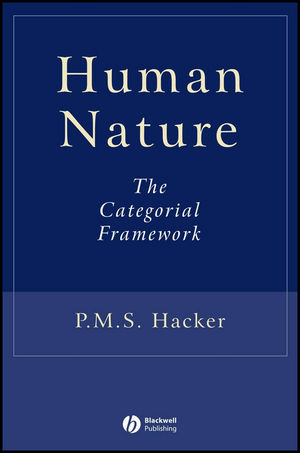Human Nature: The Categorial FrameworkISBN: 978-1-4443-3248-3
Paperback
344 pages
June 2010, Wiley-Blackwell
 |
||||||
Chapter 1 The Project.
1. Human nature.
2. Philosophical anthropology.
3. Grammatical investigation.
4. Philosophical investigation.
5. Philosophy and 'mere words'.
6. A challenge to the autonomy of the philosophical enterprise: Quine.
7. The Platonic and Aristotelian traditions in philosophical anthropology.
Chapter 2 Substance.
1. Substances: things.
2. Substances: stuffs.
3. Substance-referring expressions.
4. Conceptual connections between things and stuffs.
5. Substances and their substantial parts.
6. Substances conceived as natural kinds.
7. Substances conceived as a common logico-linguistic category.
8. A historical digression: misconceptions of the category of substance.
Chapter 3 Causation.
1. Causation: Humean, neo-Humean and anti-Humean.
2. On causal necessity.
3. Event causation is not a prototype.
4. The inadequacy of Hume's analysis: observability, spatio-temporal relations and regularity.
5. The flaw in the early modern debate.
6. Agent causation as prototype.
7. Agent causation is only a prototype.
8. Event causation and other centres of variation.
9. Overview.
Chapter 4 Powers.
1. Possibility.
2. Powers of the inanimate.
3. Active and passive powers of the inanimate.
4. Power and its actualization.
5. Power and its vehicle.
6. First- and second-order powers; loss of power.
7. Human powers: basic distinctions.
8. Human powers: further distinctions.
9. Dispositions.
Chapter 5 Agency.
1. Inanimate agents.
2. Inanimate needs.
3. Animate agents: needs and wants.
4. Volitional agency: preliminaries.
5. Doings, acts and actions.
6. Human agency and action.
7. A historical overview.
8. Human action as agential causation of movement.
Chapter 6 Teleology and Teleological Explanation.
1. Teleology and purpose.
2. What things have a purpose?
3. Purpose and axiology.
4. The beneficial.
5. A historical digression: teleology and causality.
Chapter 7 Reasons and Explanation of Human Action.
1. Rationality and reasonableness.
2. Reason, reasoning and reasons.
3. Explaining human behaviour.
4. Explanation in terms of agential reasons.
5. Causal mythologies.
Chapter 8 The Mind.
1. Homo loquens.
2. The Cartesian mind.
3. The nature of the mind.
Chapter 9 The Self and the Body.
1. The emergence of the philosophers' self.
2. The illusion of the philosophers' self.
3. The body.
4. The relationship between human beings and their bodies.
Chapter 10 The Person.
1. The emergence of the concept.
2. An unholy trinity: Descartes, Locke and Hume.
3. Changing bodies and switching brains: puzzle cases and red herrings.
4. The concept of a person.
Index.



